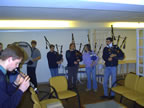

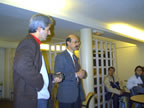
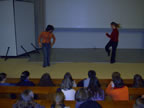


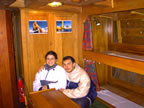
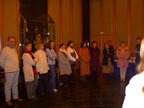
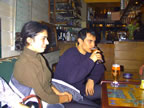
|
LE Bagad(a sort of bagpipe)traditional
Breton music instrument. On the morning of the 18 December reserved
us a surprise. We ware awaited at Le Likes by the school`s music band
which greeted us with traditional Breton music. We discovered an original
music characterized by power and dignity and which was interpreted
with talent by the students from Le Likes.
The day continued with a welcoming speech from the High School`s principal.
The Presentation of the project activities developed in the previous
months took place in the school`s amphitheatre in front of an audience
formed by students and teachers from le Le Likes. The presentation
was started by the Italian delegation with a Power Point slideshow
"Salento : a land on the sea". The presentation managed
to recreate the complexity and beauty of Italian coast side.
The variety of the landscape and the complexity of the region`s history
have contributed to the creation of artistic and cultural ensemble
of great beauty. All of Salento`s history and culture,traditional
and modern occupations, the gastronomy are all related to the sea
and will all be the subject of further studies of our Italian colleges.
After that came our presentation which began with the personal presentations
of our members and continued with a short presentation of Romania
,of it`s educational system and of our High School(Carmen Sylva).
Then came the video tape about Dobrogea and also a Power Point slideshow
"Coastal Cities at Carmen Sylava". The video tape tried
to show a little of Eforie and Constanta during winter and autumn
,the slideshow was a short presentation of 11th B`s work during the
three months September-December : the 10 km coast watch campaign in
"Eforie" - "Tuzla" and "Grindu Chituc"
,the interviews with the fisherman, the electronic photo album ,the
results of our weakly chemical determinations related to the pollution
of the sea , the three numbers of the school`s project magazine(two
in Romanian and one in English) and also the Coastal Cities web page.
The presentation was watched with some interest by all those that
witnessed it. The organization mode of the work team, the variety
and way of selection of the students that represented the school in
France aroused the interest of the French part.
After the presentations ware organized many workshops in which French
students that will work in the project have debated the presentations
of their partners and tried together with their Romanian and Italian
colleges to determine the principal lines of the future development
of the project.
Quimper Visit. The afternoon was reserved to the visitation of Quimper.The
city situated on the Odet river had in the past many problems related
to floods. The latest floods that hit the city in December 2000 have
created big problems within the city. The high school situated on
a hill had no problems but many of the students had to came to school
by boat. Right now some projects that regard the installing of an
very original water pumping system that would prevent flooding are
in the final stage.
The "Le Lougre?? L`Odet" association
At the turn of the century in France one out of two ships was Breton.
In the Breton shipyards there could have been seen thousands of sails
of all shapes and weights. Each big or small harbor had his own flotilla
adapted to it`s needs. 1800 fishing boats are still registered in
Brittany forming 1 third of the national tonnage and 40% of installed
power???. In the late 60`s the rapid decline of the fishing boats
flotilla began ,especially of the vessels that use sails. So that
the local traditions would be kept in 1989 was the project "A
ship for each harbor"was lunched. The challenge lunched by the
Chasse-Maree magazine and Ouest France have contributed to the constitution
of a large number of fishing associations of which`s main purpose
was to create new sail ships.In Quimper the association Le Lougre
de L`Odet has managed to construct and administrate Le Lougre??? a
small exhibition located in the association`s headquarters and which
shows the way of making a sail boat. After visiting the exhibition
we cast our eyes on the ship anchored for the winter on the banks
of the Odet river.
Author: Serbu Florin
|



